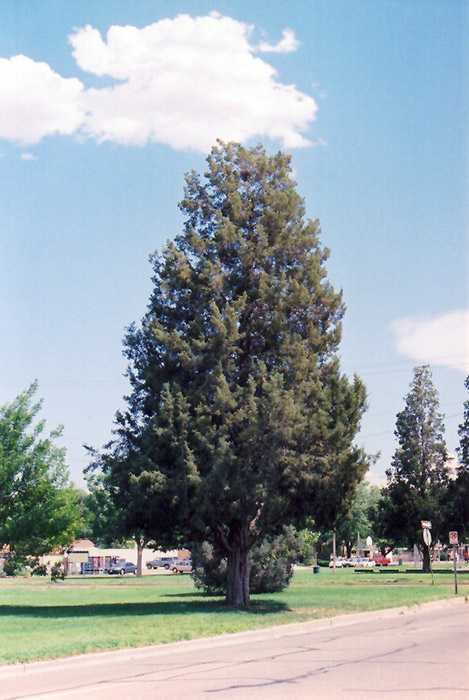Plant Finder
Rocky Mountain Juniper*
Juniperus scopulorum
* This is a "special order" plant - contact store for details
Height: 50 feet
Spread: 15 feet
Sunlight:
![]()
Hardiness Zone: 3a
Other Names: Colorado Redcedar
Description:
The champion of the upright tree junipers for harsh landscape situations; upright, pyramidal growth habit, soft textured bluish-green needle-like foliage and showy blue berries, excellent for landscape articulation; numerous and varied cultivars available
Ornamental Features
Rocky Mountain Juniper is primarily valued in the landscape for its distinctively pyramidal habit of growth. It has attractive bluish-green evergreen foliage. The scale-like sprays of foliage are highly ornamental and remain bluish-green throughout the winter. It produces silvery blue berries from late spring to late winter.
Landscape Attributes
Rocky Mountain Juniper is an evergreen tree with a strong central leader and a distinctive and refined pyramidal form. It lends an extremely fine and delicate texture to the landscape composition which can make it a great accent feature on this basis alone.
This is a relatively low maintenance tree, and is best pruned in late winter once the threat of extreme cold has passed. Deer don't particularly care for this plant and will usually leave it alone in favor of tastier treats. It has no significant negative characteristics.
Rocky Mountain Juniper is recommended for the following landscape applications;
- Accent
- Vertical Accent
- Hedges/Screening
- Windbreaks and Shelterbelts
Planting & Growing
Rocky Mountain Juniper will grow to be about 50 feet tall at maturity, with a spread of 15 feet. It has a low canopy with a typical clearance of 2 feet from the ground, and should not be planted underneath power lines. It grows at a slow rate, and under ideal conditions can be expected to live for 70 years or more.
This tree should only be grown in full sunlight. It is very adaptable to both dry and moist growing conditions, but will not tolerate any standing water. It is considered to be drought-tolerant, and thus makes an ideal choice for xeriscaping or the moisture-conserving landscape. It is not particular as to soil type or pH. It is somewhat tolerant of urban pollution. This species is native to parts of North America.
* This is a "special order" plant - contact store for details
